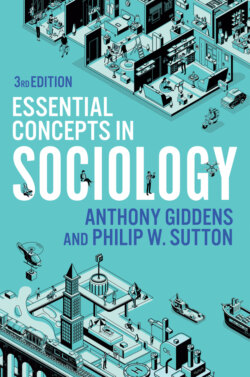Читать книгу Essential Concepts in Sociology - Anthony Giddens - Страница 20
Meaning and Interpretation
ОглавлениеThe period of modernity is said to follow from European feudalism and is an umbrella for all of the distinctive aspects of post-feudal societies. These include industrialization, capitalism, urbanization and urbanism as a way of life, secularization, the establishment and extension of democracy, the application of science to production methods, and a broad movement towards equality in all spheres of life. Modernity also instituted an increase in rational thinking and action characterized by an unemotional ‘matter of fact’ attitude, which contrasted sharply with the previous emotional and religious orientations to the world. Max Weber described this process as the gradual ‘disenchantment of the world’, spreading across the globe by an expanding, legal-rational form of capitalism.
As a social formation, modernity has been spectacularly successful in exploding the limits to the production of material goods, generating vast wealth for the relatively rich countries and bringing about more equality in many areas of life. During the twentieth century, many sociologists theorized that modernity represented a societal model that all nations would aspire to or be forced into eventually. This generic thesis came to be known as modernization theory, popularized by Walt Rostow (1961). Rostow argued that modernization was a process moving through several stages as societies ‘caught up’ with the early modernizers and their economies began to grow. From a traditional, agrarian or agricultural base, societies could modernize by shedding their longstanding traditional values and institutions and investing for future prosperity in infrastructural projects and new industries. From here, a continuous investment in advancing technology leads to higher levels of production and a drive towards mass consumption, which in turn creates a sustainable pattern of economic growth. Although countries such as Hong Kong, Taiwan, South Korea and Singapore have followed a pattern somewhat akin to this, Rostow’s model is seen today as too optimistic, as many countries, particularly in Africa, have not modernized in this way.
For some theorists, notably Zygmunt Bauman (1987), the key to understanding modernity lies in grasping its distinctive culture and mentality, which can be compared to gardening. The modern mentality is one that privileges order over randomness. Hence, if society is likened to a wild garden, then wilderness and wild nature had to be tamed and domesticated, and the growing power of nation states to do the gardening provided the means to achieve this. The gardening metaphor is not restricted to nation states, though, as the desire for order and orderliness became a normal aspect of people’s everyday modern lives.
